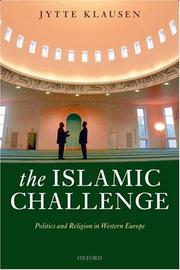| Listing 1 - 3 of 3 |
Sort by
|

ISBN: 9780199289929 9780199231980 0199289921 0199231982 Year: 2005 Publisher: Oxford: Oxford university press,
Abstract | Keywords | Export | Availability | Bookmark
 Loading...
Loading...Choose an application
- Reference Manager
- EndNote
- RefWorks (Direct export to RefWorks)
Islam --- Western Europe --- -305.697094 --- ISLAM--EUROPE --- ISLAM AND POLITICS--EUROPE --- Islam and state --- Muslims --- 305.697094 --- 081 Godsdienst --- Mohammedans --- Moors (People) --- Moslems --- Muhammadans --- Musalmans --- Mussalmans --- Mussulmans --- Mussulmen --- Religious adherents --- Mosque and state --- State and Islam --- State, The --- Ummah (Islam) --- Islam and politics --- Christianity and other religions --- Political activity --- Cultural assimilation --- Relations --- Christianity --- Musulmans --- Islam et Etat --- Islam - Europe, Western --- Islam and politics - Europe, Western --- Muslims - Political activity - Europe, Western --- Muslims - Cultural assimilation - Europe, Western --- Islam - Relations - Christianity --- Christianity and other religions - Islam --- Muslims - Europe, Western --- Islam and state - Europe, Western --- Islam in Europe --- Muslim leaders --- belief and politics --- culture --- Muslim Europe --- sexual politics --- multiculturalism --- liberal Muslims
Book
ISBN: 9781107153738 1107153735 9781316607770 1316607771 9781316599983 1108116248 1108116884 1316599981 Year: 2017 Publisher: Cambridge, England : Cambridge University Press,
Abstract | Keywords | Export | Availability | Bookmark
 Loading...
Loading...Choose an application
- Reference Manager
- EndNote
- RefWorks (Direct export to RefWorks)
National decline is typically blamed on special interests from the demand side of politics corrupting a country's institutions. The usual demand-side suspects include crony capitalists, consumer activists, economic elites, and labor unions. Less attention is given to government insiders on the supply side of politics - rulers, elected officials, bureaucrats, and public employees. In autocracies and democracies, government insiders have the motive, means, and opportunity to co-opt political power for their benefit and at the expense of national well-being. Many storied empires have succumbed to such inside jobs. Today, they imperil countries as different as China and the United States. Democracy - government by the people - does not ensure government for the people. Understanding how government insiders use their power to subvert the public interest - and how these negative consequences can be mitigated - is the topic of this book by Mark A. Zupan.
Public interest. --- Political corruption. --- Public officers. --- Civil service. --- #SBIB:35H2102 --- #SBIB:35H52 --- #SBIB:324H30 --- Bureaucrats --- Career government service --- Civil servants --- Civil service --- Government employees --- Government service --- Public employees --- Public service (Civil service) --- Elected officials --- Government leaders --- Government officials --- Officers, Public --- Officials, Elected --- Officials, Government --- Officials, Public --- Public officials --- Boss rule --- Corruption (in politics) --- Graft in politics --- Malversation --- Political scandals --- Politics, Practical --- Personeelsmanagement bij de overheid: specifieke aspecten --- Ethiek van bestuur en beleid --- Politieke cultuur --- Law and legislation --- Legal status, laws, etc. --- Corrupt practices --- PUBLIC INTEREST --- POLITICAL CORRUPTION --- PUBLIC OFFICERS --- CIVIL SERVICE --- Public administration --- Public officers --- Public service employment --- Corruption --- Misconduct in office --- State, The --- Common good --- Public interest --- Political corruption
Book
ISBN: 9780691157214 0691157219 9780691166308 0691166307 1400848644 1299725597 Year: 2013 Publisher: Princeton, N.J. Princeton University Press
Abstract | Keywords | Export | Availability | Bookmark
 Loading...
Loading...Choose an application
- Reference Manager
- EndNote
- RefWorks (Direct export to RefWorks)
How do terrorist groups control their members? Do the tools groups use to monitor their operatives and enforce discipline create security vulnerabilities that governments can exploit? This title examines the great variation in how terrorist groups are structured.
TERRORISM --- TERRORISTS --- Polemology --- Organization theory --- Terrorists. --- Terrorism. --- Acts of terrorism --- Attacks, Terrorist --- Global terrorism --- International terrorism --- Political terrorism --- Terror attacks --- Terrorist acts --- Terrorist attacks --- World terrorism --- Direct action --- Insurgency --- Political crimes and offenses --- Subversive activities --- Political violence --- Terror --- Criminals --- Violent crimes --- Organized crime --- Organizational behavior. --- History. --- Behavior in organizations --- Management --- Organization --- Psychology, Industrial --- Social psychology --- Crime syndicates --- Organised crime --- Crime --- Fatah. --- Hamas. --- Islamist groups. --- Islamist terrorism. --- Middle East. --- Northern Ireland. --- Palestinian terrorist groups. --- Provisional IRA. --- Russian terrorist groups. --- Tsarist secret police. --- Ulster Defense Association. --- Ulster Volunteer Force. --- agency problems. --- agency theory. --- al-Qa'ida in Iraq. --- al-Qa'ida. --- bureaucracy. --- control. --- counterterror policies. --- counterterrorism policies. --- discrimination. --- group-specific vulnerabilities. --- hierarchy. --- internal dynamics. --- internal politics. --- managerial challenges. --- managerial problems. --- negotiated settlement. --- operational management. --- organizational analysis. --- organizational challenges. --- organizational dynamics. --- organizational resources. --- political goals. --- preference divergence. --- secrecy. --- secular nationalist groups. --- security reducing. --- security risks. --- security-control tradeoff. --- strategic interactions. --- terrorism. --- terrorist activity. --- terrorist group structure. --- terrorist groups. --- terrorist leaders. --- terrorist operatives. --- terrorist organizations. --- terrorists. --- uncertainty. --- violence.
| Listing 1 - 3 of 3 |
Sort by
|

 Search
Search Feedback
Feedback About UniCat
About UniCat  Help
Help News
News